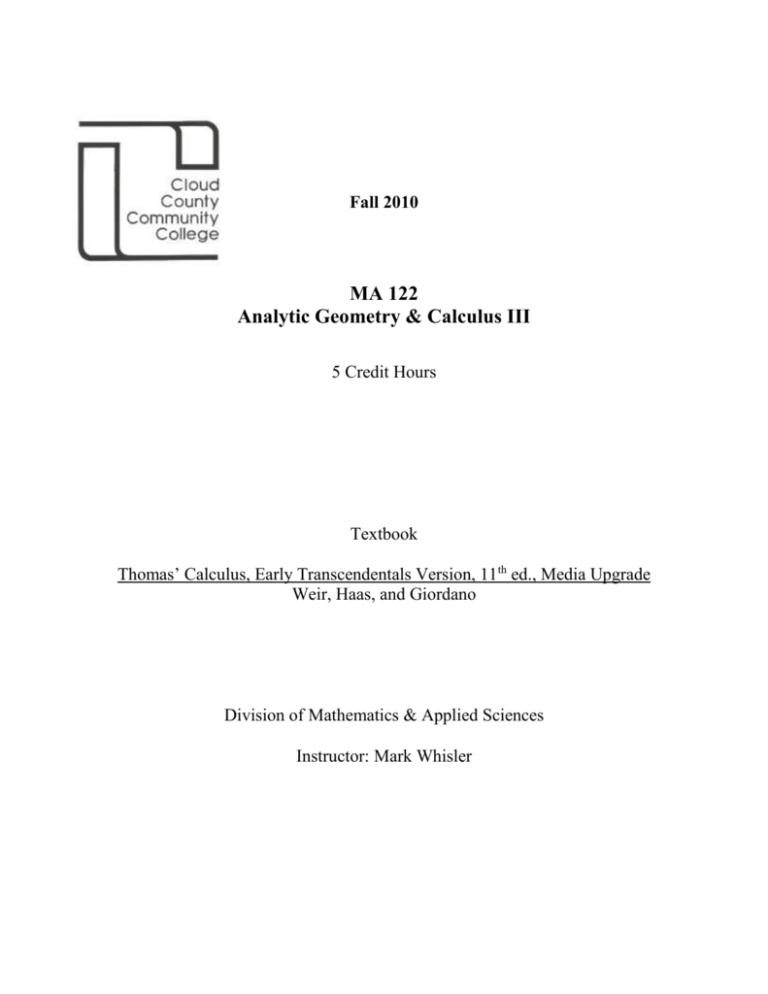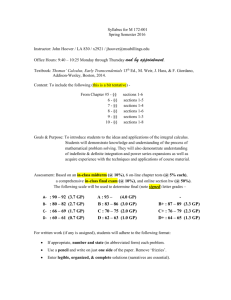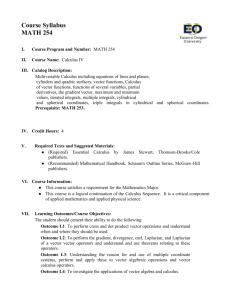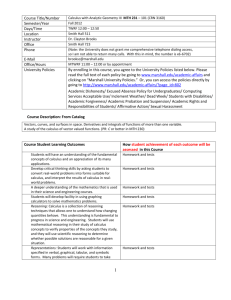
Fall 2010
MA 122
Analytic Geometry & Calculus III
5 Credit Hours
Textbook
Thomas’ Calculus, Early Transcendentals Version, 11th ed., Media Upgrade
Weir, Haas, and Giordano
Division of Mathematics & Applied Sciences
Instructor: Mark Whisler
Analytic Geometry & Calculus III
Fall 2010
Course Number:
MA 122
Time & Day: Monday, Tuesday, Wednesday 4:00 – 5:40 PM
Location: Rm. 207
Instructor:
Mark Whisler
Office: F17, across from Rm. 222 in the yellow pod
Phone: Office, x221; Home 785-243-2841
Email: mwhisler@cloud.edu
Required Materials: The text, Thomas’ Calculus, Early Transcendentals Version, Media Upgrade, 11th edition,
Weir, Haas and Giordano, Pearson/Addison-Wesley, 2008; a scientific calculator that does not have a Computer
Algebra System built in.
Office Hours: MWF 1:30 – 4:00 PM; T – Th 9:00 – 9:25 and 2:00 – 4:00 PM
Or by appointment. If my door is open and I’m not with someone else, feel free to drop in as well.
Advisement Center: Not applicable
COURSE DESCRIPTION: Students will study vectors, vector functions, surfaces, differentiation, integration,
cylindrical and spherical coordinates, and vector calculus. Practical applications will include arc length and
area, volume, extrema, Kepler’s laws, and moments.
PREREQUISITE: A C or better in MA 121, Analytic Geometry and Calculus II.
SEQUENCING:
This course is offered fall semesters only. It may be offered during summer sessions at an instructors’
discretion.
METHOD OF EVALUATION/GRADING:
Grading is on a standard scale, so if you maintain an average of 90 or better, you will get an A in the course,
between 80 and 90 is a guaranteed B, and so forth. If your final average rounds (to the nearest percent) to the
higher grade, I may give you the higher grade. Your grade will be determined in the following manner. I will
find your average grade (in percentage form) for each portion of the class (homework, in-class work and tests). I
will then multiply these average scores by the following weights:
Homework
20%
In-class work
20%
5 Tests
40%
Final Exam
20%
Information on how I will grade most homework and individual in-class work questions:
Most exercises that I grade will be marked according to the following scale:
4 points- the assigned question is correctly answered, with work shown that was done to find that answer. This
work has no mistakes, and the answer given comes from that work.
3 points-The assigned question is incorrectly answered, with work shown that was done to find that answer.
The incorrect answer comes from a minor error (transposing digits, changing addition to subtraction, arithmetic
errors, etc.).
2 points- The question is incorrectly answered, with work shown that was done to find that answer. There is a
major error (incorrect differentiation, for example) OR more than one minor error in the work. OR The
incorrect problem is attempted.
1 point- The question is incorrectly answered, with conceptual errors (possibly along with minor errors) in the
work. An example of a conceptual error is cancelling common terms in a fraction or subtracting to undo
multiplication.
0 points- the question is not attempted. OR The question is answered with no attempt to show any work to
justify the answer. OR The given answer doesn't follow (and couldn't follow) from the work shown.
Your score for the set will be the ratio of points earned to total possible points, converted to a percentage. An
example: If I grade 6 problems, there are 24 possible points. If you then earn 21 of those 24 points, your score
would be 21/24 = .875, which I would round down to an 87.
TEACHING METHODS:
This class will be a mix of activities, participatory lecture and individual or group work on practice problems
relating to the topic(s) being discussed.
ASSIGNMENT POLICY:
Homework
I will give out homework assignments on a regular basis. Due dates will vary. Please pay attention to when
homework is due, or if homework has been assigned. Let me clearly state that if you miss a class, it is
YOUR responsibility to check if homework has been assigned.
You may work together on these assignments if you wish (in fact I recommend it, as long as everybody is
contributing). Talking about the material with other people, including me, is often very useful.
Homework must be submitted before I return the set to the class. I will accept no homework after that, and I
will not assign another set in its place.
In-class work
I intend for you to do a fair amount of work in class. The format of this work will vary (mainly quizzes and
individual/group work on new material), and some of it will be graded.
I will not make up graded in-class work without prior arrangement. If you have a valid reason for missing
graded in-class work, I simply won’t count that as part of your grade.
Some of this work will be graded, while some of it will simply give you feedback on whether you’ve
understood a particular topic.
I will also award points to people who catch any mistakes that I may make. These points may be used as part of
either your homework or in-class grade, to compensate for missed assignments, bad days, etc. The awarding of
these points may not push an average beyond 100%.
COURSE POLICIES
ACADEMIC INTEGRITY
It is imperative that each student does his/her own work. The following policy will apply to all students in
class.
Infractions of academic integrity (honesty) shall include:
Using another student’s work without giving the student credit for the work. In other words, taking
someone else’s file and placing your name on it and claiming it is yours, using another student’s quiz, or
help on a quiz/exam.
Giving another student your file(s) knowing that he/she intends to turn it in as his/her own creation,
giving another student your quiz, or help on a quiz/exam.
It is not an infraction of the policy to help another student understand how to do an assignment if he/she does
the work himself/herself with your assistance.
Cheating:
“Cheating means getting unauthorized help on an assignment, quiz or examination.”
1. You must not receive from any other students or give to any other students any information, answers, or
help during an exam.
2. You must not use unauthorized sources for answers during an exam. You must not take notes or books
to the exam when such aids are forbidden, and you must not refer to any book or notes while you are
taking the exam unless the instructor indicates it is an “open book” exam.
3. You must not obtain exam questions illegally before an exam or tamper with an exam after it has been
corrected.
Materials taken from “Academic Dishonesty in Our Classrooms.” Instructional Exchange, 1990, 2 (2), 1-4 (Newsletter available from the Office of
University Assessment and Intellectual Skills Program, Western Michigan University)
Plagiarism:
“Plagiarism” means submitting work as your own that is someone else’s. For example, copying material from a
book, the Internet, or another source without acknowledging that the words or ideas are someone else’s and not
your own is plagiarism. If you copy an author’s words exactly, treat the passage as a direct quotation and
supply the appropriate citation. If you use someone else’s ideas, even if you paraphrase the wording,
appropriate credit should be given. You have committed plagiarism if you purchase a term paper or submit a
paper as your own that you did not write.
PENALTIES FOR INFRACTIONS:
If I catch you cheating on a quiz or test, here is what I will do. The first incident will get you a 0 on the quiz, or
test. If there is a second incident, I will give you an F for the class.
ATTENDANCE POLICY:
Attendance is important! It will be difficult for you to have a good experience in this class if you don't attend
regularly. I will take attendance on a regular basis. I avoid scheduling appointments during classes, and so
should you. I will not make up class work missed due to appointments set during class; see the section “In-class
Work” above.
CONDUCT:
Mature behavior is expected. Please respect others by turning off pagers, cell phones, and other electronic
devices, and by being on time for class. Please do not engage in behavior that is a distraction to your fellow
classmates. Please dress appropriately for being in public. Getting involved in the class will help make your
experience better.
TESTS:
We will have 5 tests, given in class on or about the following dates: Monday, Aug. 30, Mon., Sep. 13, Mon.,
Oct. 11, Tuesday, Nov. 2, and Monday, Dec. 6. Put these on your calendar now, so that you don’t accidentally
miss them or forget to study for them. Tests will be mainly open response questions, possibly with a few fill-inthe-blank questions. The date for the final is not yet set. More info later…
EXAMINATION POLICY:
Under most circumstances I will make up exams. You should contact me as soon as possible to arrange a time
for you to make up the exam. Makeup exams normally must be taken within two weeks of the original test date;
you will be given a grade of 0 for any exams not taken within this time period unless there are extenuating
circumstances. Any exams not taken by Friday, Dec. 10 will earn a grade of 0.
INSTRUCTOR ASSISTANCE:
As your instructor, I should be your main resource. I am here to help you! Please don’t wait if you’re having
difficulty with material. Speak up in class or come see me in my office.
TUTOR ASSISTANCE:
There are web resources available for tutoring; just google “math tutoring” or something similar. One website
you might try is http://www.academicsuccess.com/studentResources.html. It has many links to other websites
that may be useful.
INCOMPLETE POLICY:
Students will not be given an incomplete grade in the course without sound reason and documented as described
in the Student Handbook. The incomplete must be made up with the instructor assigning the incomplete and
must be completed the semester immediately following the semester in which the class was taken. Refer to the
Student Handbook for a complete explanation.
ACADEMIC COMPLAINTS:
Cloud County Community College has an Academic Due Process Policy to address any student academic
complaints. For any unresolved complaints, the policy can be obtained from the Academic Affairs Office.
GENERAL EDUCATION GOALS:
Not applicable
DEPARTMENT GOALS:
1. Prepare students for future courses and for the mathematical requirements encountered in other disciplines
and future careers.
2. Define arithmetic, algebraic, geometric, spatial and statistical concepts.
3. Calculate arithmetic, algebraic, geometric, spatial and statistical quantities using appropriate technology.
4. Estimate arithmetic, algebraic, geometric, spatial and statistical quantities.
5. Simplify and/or solve arithmetic, algebraic, geometric, spatial and statistical expressions, equations and
problems using appropriate technology.
6. Represent mathematical information numerically, symbolically, graphically and verbally using appropriate
technology.
7. Develop mathematical and statistical models such as formulas, functions, graphs and tables using appropriate
technology.
8. Interpret mathematical and statistical models such as formulas, functions, graphs and tables using appropriate
technology.
COURSE GOALS:
Students will be expected to use appropriate technology as one tool to achieve the following outcomes:
The student should be able to:
.Having taken this course, the student should be able to:
A. use vectors and vector-valued functions in space, and be able to compute dot and vector products, as well as
the equations of lines and planes in space.
B. use alternative coordinate systems (cylindrical or spherical) when advantageous.
C. use the TNB frame to describe the motion of a particle in space.
D. evaluate multivariable functions, and compute directional derivatives, tangent planes, and gradient vectors of
those functions.
E. find the linearization of a multivariable function for approximation purposes.
F. find local extrema of a multivariable function, if they exist, possibly using Lagrange multipliers.
G. use Taylor's formula to find approximation for a multivariable function.
H. compute multiple integrals in the different coordinate systems, as well as masses and moments.
I. compute line integrals, work, circulation, and flux of a function in a vector field.
J. use path independence, potential functions, and conservative fields in vector analysis.
K. use Green's Theorem to calculate the divergence, flux, or circulation of a vector field, or to evaluate a line
integral.
L. calculate surface area and surface integrals.
M. use Stokes' Theorem to calculate the circulation or curl of a vector field.
N. calculate flux through a surface using the Divergence Theorem.
ASSESSMENT of COURSE OUTCOMES:
Students who complete this course, Analytic Geometry & Calculus III, at Cloud County Community College
will be assessed on the following course outcomes:
1. Use vectors and vector-valued functions in various situations.
2. Use alternative coordinate systems as appropriate.
3. Find derivatives of multi-variable functions, as well as compute directional derivatives, tangent planes, and
gradient vectors of multivariable functions.
4. Find local extreme points of multivariable functions in both unconstrained and constrained situations.
5. Compute various integrals (multiple, line, surface).
6. Use the major theorems of this course in vector analysis, to compute work, divergence, circulation and flux of
a function in a vector field.
ACCOMMODATION FOR DISABILITY:
If you need accomodation for any type of disability, contact the Director of Advisement and Counseling,
located in the Advisement Center.
INCLEMENT WEATHER POLICY:
In case of extremely severe weather, the college may close. The following radio and TV stations will be
notified:
KNCK
1390 AM
Concordia
KCLY
100.9 FM
Clay Center
KREP
92.1 FM
Belleville
KHCD
89.5 FM
Hutchinson
KVSV
1190 AM
Beloit
KSAL
1150 AM
Salina
WIBW (TV) Chan. 13
Topeka
KWCH (TV) Chan. 12
Wichita
KOLN (TV) Chan. 10
Lincoln, NE
Notification will also be placed on the internet at www.cancellations.com. A text message will also be sent out
on the Emergency Text Messaging System for the students who have signed up for it.
Students should call the switchboard at 800-729-5101 or 785-243-1435 if they are unable to attend class due to
hazardous conditions. Night class and off campus class cancellations are left to the discretion of the instructor.
EMERGENCY NOTIFICATION PROCEDURE:
When alarms are sounded or crisis conditions arise, you will be instructed to move to a designated safe area or
to remain in the classroom until the crisis has passed. If you are informed to leave the room, take as many of
your personal belongings as time permits. Cell phones and other electronic devices are only to be used once
you arrive in the safe area outside the building. Students requiring special assistance will be the responsibility
of the instructor or staff person.
Systems of alert for tornado or bomb threat: PA system, phone, or staff interruption of class. In case of fire, the
alarm will sound.
If directed to leave the building, evacuate to the soccer field unless an alternate safe location has been
designated.









